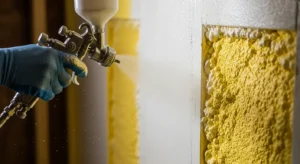Spray foam insulation is a desired choice for homeowners and property owners due to its energy-saving properties and effectiveness in maintaining indoor temperature. However, spray foam insulation is not exempt from myths and misconceptions like any other product or technology. In this blog post, we will debunk some common myths surrounding spray foam insulation to provide accurate information and help you decide about its installation.
Myth #1: There’s no Difference Between Open-Cell and Closed-Cell Spray Foams
Open-cell and closed-cell spray foams are two distinct types with different properties and characteristics. Open-cell spray foam is less dense and expands more during installation, offering comparable thermal and acoustic properties to fiberglass. On the other hand, closed-cell spray foam is thicker and has a higher R-value, making it more effective in insulating against heat transfer.
Myth #2: Spray Foam Insulation is a Fire Hazard
Contrary to this myth, spray foam insulation has a higher combustion point than most objects in a house. In a fire, properly installed spray foam insulation can help contain the fire rather than fuel it. Additionally, when the foam is installed to create an airtight seal, the fire eventually runs out of oxygen, impeding its growth.
Myth #3: Spray Foam Insulation Can Cause Health Problems
While professional installers take precautions during the installation process, such as using protective coverings and respirators, the notion that spray foam insulation harms health is unfounded. After the foam sets and cures, it releases no further fumes or poses health concerns. Reentering the building after installation is complete is safe.
Myth #4: Spray Foam Insulation Will Shrink Over Time
High-quality spray foam insulation, when properly applied, should not shrink over time. However, shrinkage can occur if the installation process needs to be fixed, such as incorrect mixing of chemical components or improper temperature and humidity levels during installation. The spray foam insulation should maintain its integrity with the proper installation techniques.
Myth #5: Icynene Spray Foam Insulation Costs Way Too Much
The myth that Icynene Spray Foam Insulation is expensive is only partially accurate. While the cost of spray foam insulation can vary depending on various factors, such as the size of the area to be insulated, the kind of spray foam used, and the labor costs, it offers several long-term benefits that make it a worthwhile investment.
Although the upfront cost may be higher than other insulation options, the energy savings achieved through improved thermal efficiency can often offset the initial investment within a few years.
Additionally, spray foam insulation provides superior air sealing, moisture control, and soundproofing properties, contributing to increased comfort and reduced utility bills over the long term.
Myth #6: Because Spray Foam isn’t as Thick as Batts of Fiberglass, it Can’t Also Insulate
The myth that sprayed foam insulation cannot insulate as well as batts of fiberglass due to its thickness needs to be more accurate. While spray foam insulation may not be as thick as traditional fiberglass batts, it offers superior insulation performance due to its unique properties.
Spray foam insulation is a liquid that spreads and fills gaps and cracks, creating an effective air barrier and minimizing thermal bridging. Its ability to seal air leaks and provide a continuous insulation layer makes it highly efficient in preventing heat transfer and improving energy efficiency.
Additionally, spray foam insulation has a high R-value, which measures its thermal resistance, indicating its effectiveness in resisting heat flow.
Myth#7: Spray Foam Insulation Can Damage Pipes and Wires
Properly installed spray foam insulation will not damage pipes and wires. However, care should be taken during installation to avoid any potential issues.
Spray foam can act as a protective barrier, providing insulation around pipes and wires and preventing condensation and potential damage from temperature fluctuations. However, it’s crucial to ensure the installation is done correctly, not directly spraying the foam onto pipes or wires and providing sufficient clearance and protection for these components.
Read More: How Insulation Adds Value to Your Home or Business Location
Conclusion
Spray foam insulation has been demonstrated to be a valuable option for homeowners and property owners seeking energy-efficient insulation. However, it is essential to separate fact from fiction to understand its properties and benefits. By debunking the common myths surrounding spray foam insulation, we hope to provide you with accurate information to help you make an informed decision about its installation. Remember to consult with professionals and reputable contractors for proper installation and guidance.
Contact Air Seal Insulation at (718)-821-6800. We have the experience and understanding to identify the challenges you may face.



